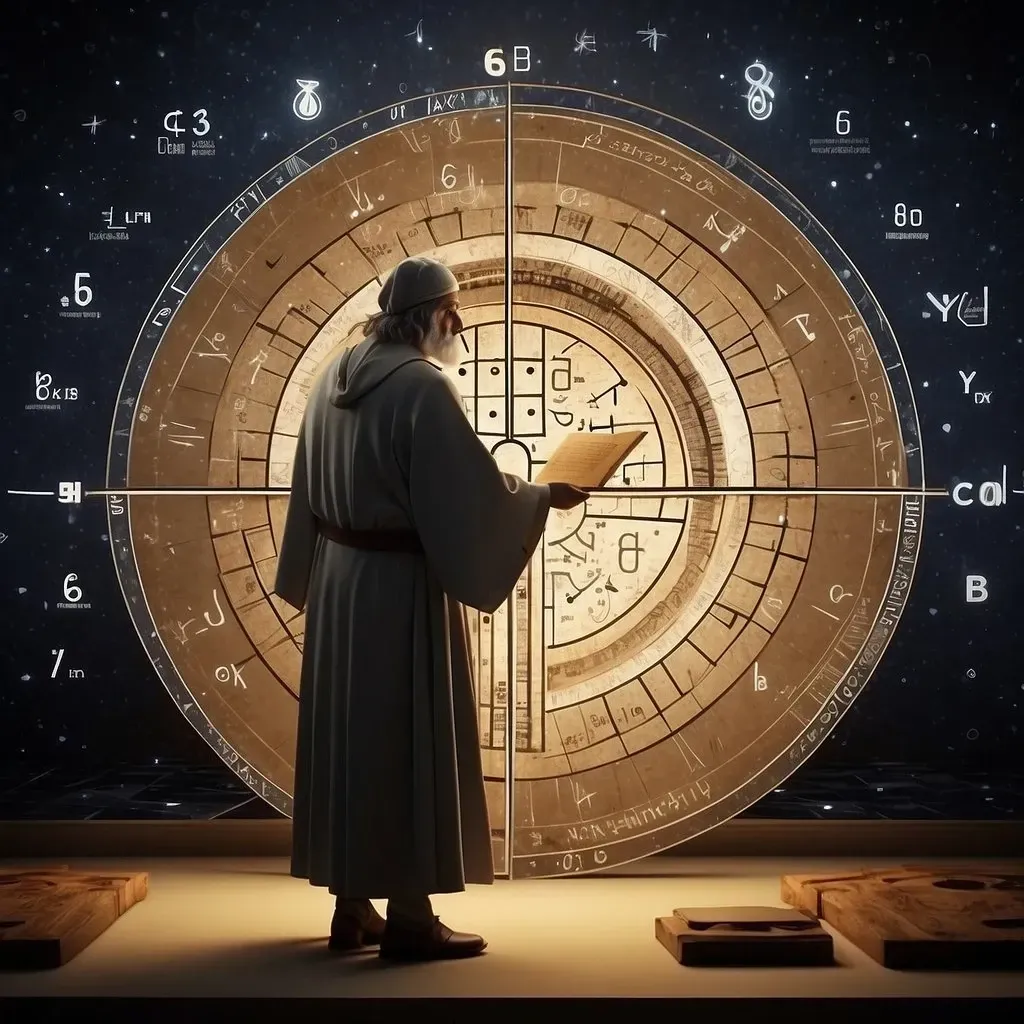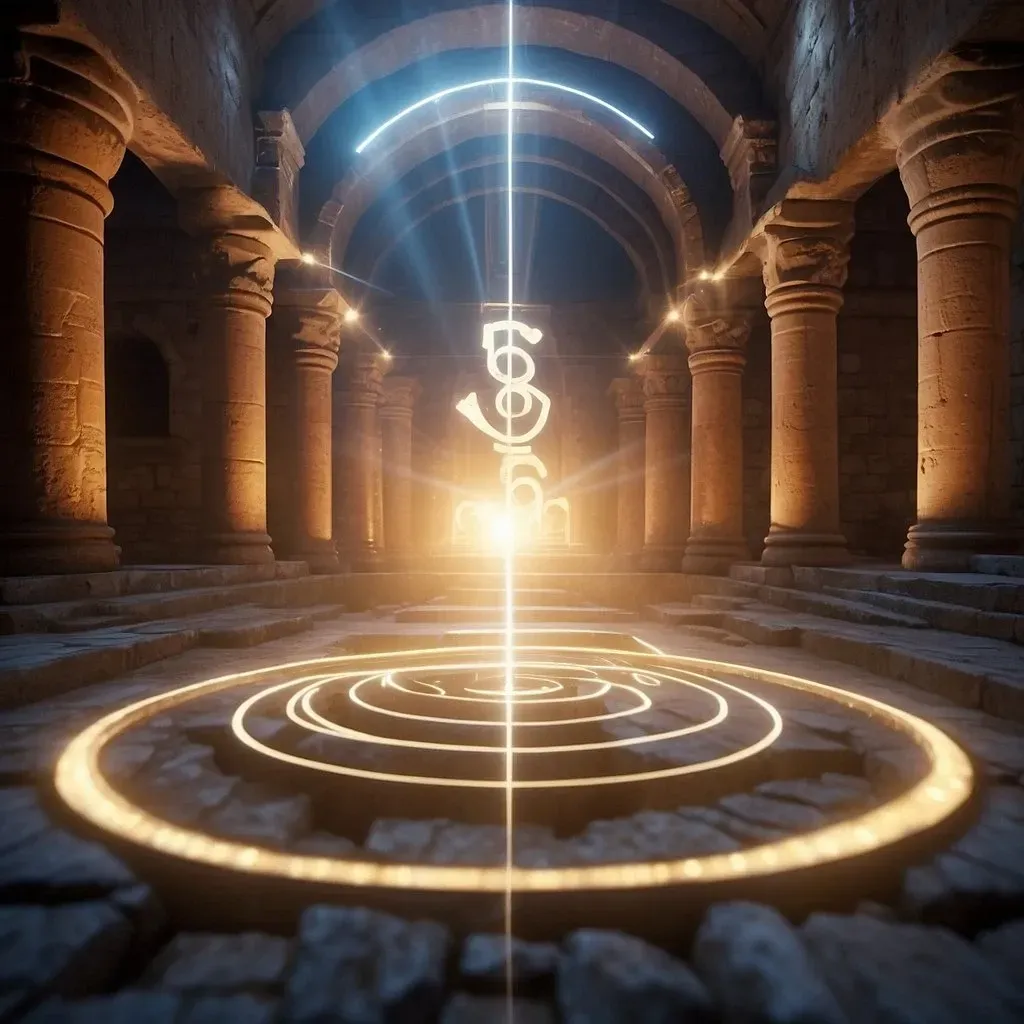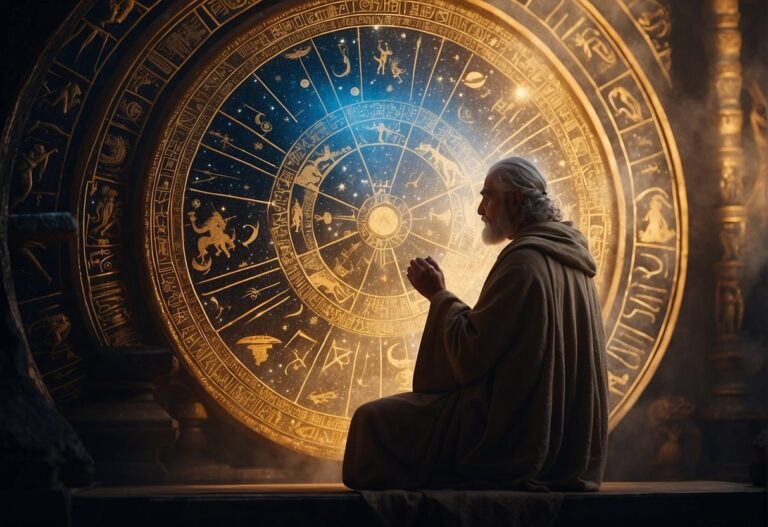In the lush, vibrant landscape of ancient Greece, where the whispers of the gods seemed to echo through the olive groves and the very stars in the heavens danced to the music of the cosmos, there lived a man whose legacy would transcend time. This man, Pythagoras, was not only a brilliant philosopher and mathematician but also a seeker of the mystical truths that lie hidden in the fabric of the universe. His name has become synonymous with the enigmatic world of numerology, a realm where numbers are more than mere symbols of quantity—they are the keys to understanding the divine.
As we embark on this journey through the life and teachings of Pythagoras, we will uncover the secrets of numerical mysticism—a path that leads to the heart of all things spiritual. With each number holding a sacred vibration and every equation telling a story of the cosmos, Pythagoras’s insights offer a celestial map to those who seek to understand the mysteries of the universe.
So, dear seeker, let us traverse this ancient landscape together, exploring the profound influence of Pythagoras on the mystical tradition of numerology and the enchanting concept of angel numbers. Prepare to have your mind expanded and your spirit uplifted as we delve into a philosophy that has shaped the destiny of seekers and sages for millennia.

The Life of Pythagoras: The Sage Behind the Numbers
The Enigmatic Origins of a Philosophical Maverick
Early Life and Education of Pythagoras
In the silvery dawn of the 6th century BCE, on the sun-kissed isle of Samos, a child was born who would become the architect of numerical mysticism. Pythagoras, often shrouded in the mists of legend, began his life journey with an insatiable thirst for knowledge. His early education was as diverse as the lands he would come to explore, studying under the tutelage of renowned thinkers of his time. It was this foundation that carved the outlines of a mind that would later challenge the very essence of reality.
A Journey of Cultural Enlightenment
Pythagoras was not content to simply absorb the wisdom of his immediate surroundings. With a heart as wide as the Aegean, he ventured far and wide, seeking the secrets held by the great civilizations of the ancient world. From the hallowed halls of Egypt to the mystical lands of Babylon, Pythagoras became a vessel for the sacred knowledge of antiquity, each culture imparting upon him a piece of the cosmic puzzle.
The Establishment of the Pythagorean Brotherhood
Upon his return to the Grecian world, Pythagoras settled in the town of Croton, in southern Italy, where he established a philosophical and religious school that would become the birthplace of Pythagoreanism. This brotherhood was more than an academy; it was a community bound by shared beliefs and practices, a sanctuary where the mind and spirit could unite in the pursuit of higher truths. Here, amid the fellowship of like-minded seekers, the Pythagorean teachings on the mystical properties of numbers began to take shape, forever altering the course of spiritual and philosophical thought.
In this sacred space, Pythagoras and his followers delved into the divine nature of numbers, seeking to unravel the threads that wove the visible and invisible worlds together. It was a place where philosophy, science, and mysticism danced in harmony, and where the whispers of the divine could be heard in the language of mathematics.
Pythagorean Philosophy: Decoding the Symphony of the Spheres
The Cosmic Tapestry of Pythagoreanism
The Pythagorean Worldview and Its Cosmology
In the heart of Pythagoras’s teachings lay a profound understanding of the cosmos as an intricately woven tapestry, where each thread was a number and each pattern a divine law. This worldview saw the universe as a living, harmonious system, governed by ratios and proportions that resonated with the music of the spheres. Pythagoras taught that numbers were the essence of all existence, the building blocks of reality that shaped the stars, the seasons, and the very soul of humankind.
Harmonizing the Heavens and Earth
The Concept of the Harmony of the Spheres and Its Relation to Numerology
To Pythagoras, the planets and stars moved according to celestial harmonies, inaudible to the human ear but deeply felt within the spirit. This celestial music was a testament to the order of the universe, with each note corresponding to a numerical vibration. Numerology, in the eyes of Pythagoras, was the study of these vibrations, revealing the sacred relationships between numbers and the elements of the natural world. It was through this understanding that one could attune to the divine harmony and find alignment with the cosmos.
Living Numbers: The Pythagorean Ethos
Pythagoreanism as a Way of Life, Including Its Ethical and Mystical Dimensions
The followers of Pythagoras didn’t merely study numbers; they lived by them. Pythagoreanism was a holistic approach to life, where ethics, mathematics, and mysticism were intertwined. The community adhered to strict rules of conduct, dietary codes, and shared property, all reflective of the numerical principles that governed their existence. Silence, reflection, and purity were not just practices but expressions of the numerical order that structured the universe. In this way, the Pythagorean life was a continuous act of devotion, an embodiment of the mystical truths that numbers revealed.
The Mystical Properties of Numbers: Pythagoras’s Numerical Revelation
The Soul of Numbers
The Significance of Numbers in Pythagorean Teaching
In the garden of Pythagorean thought, numbers were not mere symbols; they were living entities with personalities, powers, and purpose. Each number held a unique place in the cosmos, serving as a cornerstone of the universal structure. Pythagoras unveiled the soul of numbers, teaching that they were the ultimate reality behind all things seen and unseen. From the solitary ‘1’, embodying unity and the origin of all things, to the perfect ’10’, representing the completeness of the cosmos, every number was a key to unlocking the mysteries of existence.
The Sacred Decad: Tetractys
Exploration of Key Numbers and Their Meanings
The Tetractys, a triangular figure composed of the first four numbers that add up to the perfect number ’10’, was sacred in Pythagorean numerology. It symbolized the harmony of the universe, encapsulating the essence of space and time. Each level of the Tetractys had its own meaning: the point, the line, the plane, and the solid. Pythagoras’s followers meditated upon this symbol, seeking the profound spiritual insights it contained. It was more than a mathematical curiosity; it was a divine revelation.
The Tetractys: A Symbol of Cosmic Order
The Tetractys and Its Role in Pythagorean Numerology
The Tetractys was not just a symbol; it was a cosmic hymn. Each of the points was associated with a note in the musical scale, creating a harmony that mirrored the music of the spheres. In the arrangement of the Tetractys, Pythagoras encoded the ratios that governed music, astronomy, and the human soul. To contemplate the Tetractys was to engage in a silent prayer, a contemplation of the divine order that Pythagoras believed could be heard in the silence of the heart, resonating with the vibrations of the universe.
Pythagorean Numerology in Historical Context: A Tapestry of Timeless Wisdom
A Confluence of Ancient Numerologies
Comparison with Other Numerological Systems of the Time
Pythagoras’s numerological insights did not emerge in isolation. They were part of a broader tapestry of ancient wisdom where numbers served as a universal language. By comparing Pythagorean numerology with the number systems of ancient Egypt, Mesopotamia, and China, we can see a fascinating interplay of ideas and beliefs. These civilizations also recognized the sacred nature of numbers, each contributing its voice to the chorus of numerical mysticism that echoed through the ages.
The Pythagorean Influence on Greek Thought
The Influence of Pythagorean Numerology on Greek Philosophy and Mathematics
The ripples of Pythagorean numerology extended far beyond the brotherhood’s inner circle. Its influence permeated the fabric of Greek thought, shaping the work of Plato, Aristotle, and later mathematicians. Pythagorean ideas about the fundamental role of numbers in the cosmos laid the groundwork for the development of Western science and philosophy, establishing a legacy that would endure for centuries.
The Enduring Echoes of Pythagorean Doctrine
How Pythagorean Ideas Survived and Evolved Through the Ages
Though the Pythagorean school eventually faded into history, the echoes of its teachings continued to resonate throughout the ages. The early Christian scholars, the Islamic mathematicians, and the Renaissance thinkers all found inspiration in Pythagorean numerology. Its survival and evolution are a testament to the enduring power of Pythagoras’s vision—a vision that saw numbers as the ultimate harbingers of the mysteries of life and the divine order of the universe.
The Legacy of Pythagorean Numerology: Numbers That Shaped the Spirit
The Renaissance of Numerical Wisdom
The Adoption and Adaptation of Pythagorean Numerology in Various Mystical and Esoteric Traditions
As the Renaissance bloomed across Europe, a renewed fascination with the ancient world rekindled the flames of Pythagorean numerology. The mystical traditions of the time, from the alchemists to the Hermeticists, eagerly adopted and adapted Pythagorean concepts. They saw in numbers a path to the divine, a means of transforming the soul, and a blueprint of the universe’s hidden order. The legacy of Pythagoras’s numerical mysticism found new life in these esoteric circles, bridging the gap between the ancient and the modern.
The Numerical Threads in the Tapestry of Time
How Pythagorean Ideas Survived and Evolved Through the Ages
Despite the ebb and flow of empires and the march of time, the threads of Pythagorean numerology have remained woven into the fabric of philosophical and spiritual thought. From the secretive societies of medieval Europe to the transcendentalists of the 19th century, Pythagorean numerology has been a beacon for those seeking to understand the deeper truths of existence. Its survival is a testament to the timeless nature of its wisdom and its capacity to inspire wonder and enlightenment across generations.
Pythagoras’s Enduring Echoes in Modern Spirituality
The Connection Between Pythagorean Numerology and the Concept of Angel Numbers
Today, Pythagorean numerology finds its reflection in the enchanting realm of angel numbers. These sequences, believed by many to carry messages from the divine, resonate with the ancient Pythagorean belief in the spiritual significance of numbers. As individuals around the world turn to angel numbers for guidance and insight, they unknowingly engage with a tradition that dates back to Pythagoras—a tradition that views numbers as the whispers of the angels and the language of the universe. The Pythagorean legacy lives on, as mystical as ever, in the hearts of those who look to the numbers for signs and wonders.
Pythagoras’s Influence on Modern Numerology and Angel Numbers: Bridging Ancient Wisdom and Contemporary Insights
The Renaissance Gateway to Modern Mysticism
The Resurgence of Interest in Numerology During the Renaissance and the New Age Movement
The Renaissance, a time of intellectual rebirth and cultural revival, served as a crucial gateway for the resurgence of Pythagorean numerology. It was during this era that scholars re-discovered ancient texts and began to see the world through the lens of classical wisdom. This period set the stage for the New Age movement, which emerged centuries later, embracing numerology as a tool for personal and spiritual development. The New Age movement’s holistic approach to life and the universe breathed new life into Pythagorean principles, adapting them to contemporary paths of enlightenment.

The Numerological Tapestry Weaved into Daily Life
The Connection Between Pythagorean Numerology and the Concept of Angel Numbers
In today’s spiritual landscape, angel numbers are a vibrant thread in the tapestry of modern mysticism, and their connection to Pythagorean numerology is undeniable. These sequences of numbers that people frequently encounter are believed to hold guidance and messages from the divine realm. Pythagoras’s belief in the significance of numbers and their cosmic vibrations is mirrored in the way angel numbers are interpreted today—as signs and symbols guiding us towards our higher purpose and deeper understanding.
A Legacy Enshrined in Spiritual Practice
Interpretations from Modern Numerology Experts on Pythagoras’s Lasting Impact
Experts in modern numerology often look back to Pythagoras as the father of their practice, drawing upon his teachings as they interpret the numerical patterns in our lives. They see his work as the cornerstone of a spiritual methodology that transcends time, one that continues to offer insight into the fabric of our existence. Pythagoras’s influence is evident in the methods used by contemporary numerologists, whether they are casting a personal numerology chart or deciphering the meaning behind recurring numerical patterns.
In every whisper of number sequences, in every alignment of digits that seem to call out to us, we can find the echoes of Pythagoras’s ancient wisdom. His influence on modern numerology and the enchanting world of angel numbers is a bridge between the mystical past and the spiritually awakened present, a testament to the enduring power of numbers to speak to the soul.
Conclusion: The Eternal Harmony of Pythagorean Legacy
Summation of a Philosophical Giant’s Contributions
Summary of Pythagoras’s Contributions to Numerology and the Concept of Angel Numbers
As we draw the curtains on our exploration of Pythagoras and his indelible mark on the world of numerology, we find ourselves in awe of the breadth of his contributions. From the ancient halls of his brotherhood to the digital pages of contemporary spirituality, his teachings on the mystical properties of numbers have shaped countless aspects of human thought. Pythagoras’s philosophy bestowed upon us the concept of numbers as carriers of divine messages, a concept that has evolved into the modern practice of interpreting angel numbers.
The Timeless Resonance of Numerical Mysticism
The Relevance of Pythagorean Numerology in Contemporary Spiritual Practices
In the current age, where the spiritual and the empirical often intersect, the relevance of Pythagorean numerology endures. It continues to inspire those who seek a deeper connection with the universe and provides a framework for understanding the subtle, numerically patterned language of the divine. The practice of tuning into angel numbers as a means of receiving guidance is a vibrant example of how ancient wisdom adapts to modern needs, offering solace and direction to seekers around the globe.
The Unbroken Circle of Numerical Enlightenment
Final Thoughts on the Enduring Legacy of Pythagoras’s Mystical Teachings
The circle, a symbol of perfection and eternity, was revered by Pythagoras, and it fittingly represents the unbroken nature of his legacy. His teachings on the mystical properties of numbers have traversed through time, unscathed by the changing eras, continuing to enlighten those on the path of spiritual discovery. As we reflect on the journey through Pythagoras’s life and insights, we are reminded that numbers are indeed the universal language, and through them, the symphony of the spheres plays on, as harmonious and as profound as ever.

